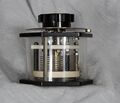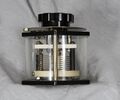758-A: Difference between revisions
Jump to navigation
Jump to search
No edit summary |
No edit summary |
||
| Line 1: | Line 1: | ||
{{GR Product | {{GR Product | ||
|model=758-A | |model=758-A | ||
|codes=WITTY | |||
|class=frequency standards and meters | |class=frequency standards and meters | ||
|summary= | |summary=Wavemeter | ||
|image=GR-758-A Close-up.jpg | |image=GR-758-A Close-up.jpg | ||
|caption=General Radio 758-A Wavemeter | |caption=General Radio 758-A Wavemeter | ||
| Line 15: | Line 16: | ||
The '''General Radio 758-A Wavemeter''' was introduced in {{Catalog K2}} and remained available through {{Catalog N}}. | The '''General Radio 758-A Wavemeter''' was introduced in {{Catalog K2}} and remained available through {{Catalog N}}. | ||
The Type 758-A is a UHF absorption type wavemeter | The Type 758-A is a UHF absorption-type wavemeter with direct reading from 5 MHz to 400 MHz in a single band. This wide range is possible by varying both capacitance and inductance simultaneously. | ||
The 758-A uses a flashlight lamp as a resonance indicator, as little as 2 watts of RF will give an indication. The instrument case is hexagonal so that the wavemeter pickup can be oriented in one of six positions. | |||
==Specifications== | ==Specifications== | ||
| Line 24: | Line 27: | ||
==Links== | ==Links== | ||
* [[Media:GR Exp 758-A 08_1940.pdf|Experimenter describing Type 758-A | * [[Media:GR Exp 758-A 08_1940.pdf|Experimenter August 1940 describing Type 758-A]] | ||
==Photos== | ==Photos== | ||
Latest revision as of 04:04, 30 April 2024
The General Radio 758-A Wavemeter was introduced in Catalog K2 (1942) and remained available through Catalog N (1954).
The Type 758-A is a UHF absorption-type wavemeter with direct reading from 5 MHz to 400 MHz in a single band. This wide range is possible by varying both capacitance and inductance simultaneously.
The 758-A uses a flashlight lamp as a resonance indicator, as little as 2 watts of RF will give an indication. The instrument case is hexagonal so that the wavemeter pickup can be oriented in one of six positions.
Specifications
- Range: 5 to 400 MHz, direct reading
- Accuracy: ±2%







